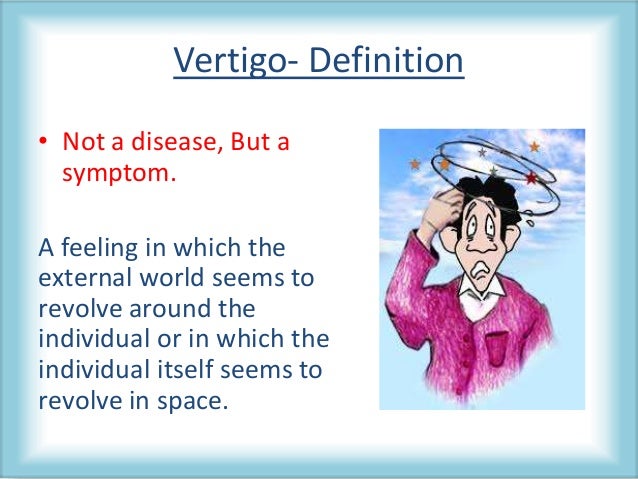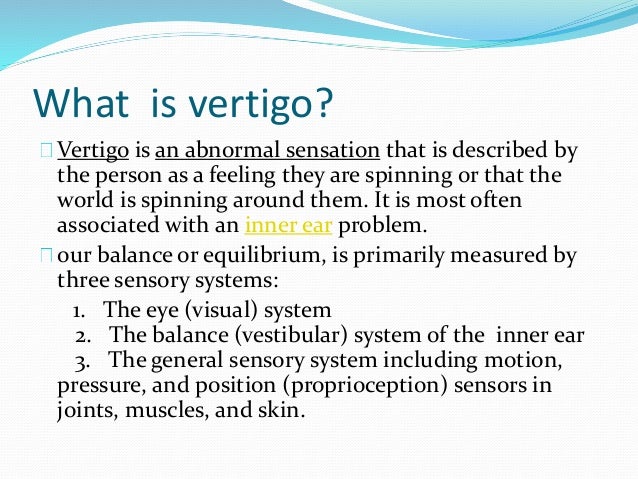
Why Am I Dizzy 7 Possible Causes Of Dizziness And How To


Vertigo Symptoms And Signs Symptoms Tips
See full list on mayoclinic. org. People experiencing dizziness may describe it as any of a number of sensations, such as: 1. a false sense of motion or spinning (vertigo) 2. lightheadedness or feeling faint 3. unsteadiness or a loss of balance 4. a feeling of floating, wooziness or heavy-headedness these feelings may be triggered or worsened by walking, standing up or moving your head. your dizziness may be accompanied by nausea or be so sudden or severe that you need to sit or lie down. the episode may last seconds or days and may recur. Dizziness has many possible causes, including inner ear disturbance, motion sickness and medication effects. sometimes it's caused by means vertigo i an underlying health condition, such as poor circulation, infection or injury. the way dizziness makes you feel and your triggers provide clues for possible causes. how long the dizziness lasts and any other symptoms you have also help pinpoint the cause.
Vertigo Causes Symptoms And Treatments

Top 10 Causes Of Vertigo New Life Ticket
See full list on drugs. com. See full list on drugs. com. Scrabble points: 11. Word origin late middle english: from latin, ‘whirling’, from vertere ‘to turn’.
Vertigo Causes Symptoms And Treatment
Dizziness can increase your risk of falling and injuring yourself. experiencing dizziness while driving a car or operating heavy machinery can increase the likelihood of an accident. you may also experience long-term consequences if an existing health condition that may be causing your dizziness goes untreated. Vertigo is a medical term that refers to the sensation of motion that is out of harmony with reality. a person with vertigo may feel like he is spinning while he is sitting still. he may also have the feeling that the room is spinning. often, it begins immediately following a movement of the head. Vertigo can happen to anyone, and there is no way to prevent the first episode. because vertigo can be associated with an intense sense of imbalance, it is important to avoid situations in which a fall could cause significant harm, like climbing a ladder or working on a slanted roof. Factors that may increase your risk of getting dizzy include: 1. age. older adults are more likely to have medical conditions that cause dizziness, especially a sense of imbalance. they're also more likely to take medications that can cause dizziness. dua. a past episode of dizziness. if you've experienced dizziness before, you're more likely to get dizzy in the future.
Vertigo is a sensation of feeling off balance. if you have these dizzy spells, you might feel like you are spinning or that the world around you is spinning. Noun. Vertigo dizziness spiritual meaning. metaphysical causes of dizziness and vertigo include desperate for love and approval but not knowing where to look for it. trying to control everything. means vertigo i trying to avoid seeing an uncomfortable truth, especially when you do not want to face a situation. in addition, it can be caused by fear or anxiety.
Vertigo is the sensation that either your body or your environment is moving (usually spinning). vertigo can be a symptom of many different illnesses and disorders. the most common causes of vertigo are illnesses that affect the inner ear, including:. Powered by oxford dictionaries.
Vertigo can feel like the room is spinning or like you are spinning in the room, or it can be just a sense of imbalance. it may be associated with nausea, vomiting and ringing in one or both ears (tinnitus). That's a classic sign of a particular type of dizziness called vertigo. it's more than feeling off-kilter and usually gets worse when you move your head. this is a symptom that there is an issue in. Dec 12, 2020 · vertigo is a sensation of feeling off balance. if you have these dizzy spells, you might feel like you are spinning or that the world around you is spinning. Dizziness is a term used to describe a range of sensations, such as feeling faint, woozy, weak or unsteady. dizziness that creates the false sense that you or your surroundings are spinning or moving is called vertigo. dizziness is one of the more common reasons adults visit their doctors. frequent dizzy spells or constant dizziness can significantly affect your life. but dizziness rarely signals a life-threatening condition. treatment of dizziness depends on the cause and your symptoms. means vertigo i it's usually effective, but the duduk perkara may recur.
Your doctor will diagnose vertigo based on your description of what you are feeling. vertigo can be divided into two major categories, peripheral vertigo and central vertigo. peripheral vertigo, which is much more common, includes benign positional vertigo, labyrinthitis and ménière's disease. positional vertigo is diagnosed when moving the head causes the vertigo and returning the head to a neutral position relieves symptoms. labyrinthitis and ménière's attacks usually come on abruptly and last from a few hours to a couple of days. there may be intense nausea and vomiting and variable hearing loss. central vertigo is a more serious dilema in the cerebellum (back part of the brain) or brain stem. your doctor will evaluate your means vertigo i eye to look for abnormal jerking movements (nystagmus). the pattern of your eye movements may help to determine if the duduk perkara is peripheral or central. usually, no further testing is needed unless your doctor suspects you have central vertigo. if central ver Vertigo is the false sense that your surroundings are spinning or moving. with inner ear disorders, your brain receives signals from the inner ear that aren't consistent with what your eyes and sensory nerves are receiving. vertigo is what results as your brain works to sort out the confusion. benign paroxysmal positional vertigo (bppv). Vertigo is a specific type of dizziness that is characterized by the sudden sensation that you are spinning or that the world around you is spinning. the feeling can come and go or it can last for.
A person with vertigo may experience balance problems and lightheadedness. vertigo is a sensation of spinning dizziness, as though the room or surrounding environment is spinning in circles around. Vertigo is the sensation that either your body or your environment is moving (usually spinning). vertigo can be a symptom of many different illnesses and disorders. the most common causes of vertigo are illnesses that affect the inner ear, including: 1. benign paroxysmal positional vertigo— in this condition, a change in head position causes a sudden sensation of spinning. the most likely cause is small crystals that break loose in the canals of the inner ear and touch the sensitive nerve endings inside. 1. acute labyrinthitis,also called vestibular neuritis — this is an inflammation of the balance apparatus of the inner ear, probably caused by a viral infection. 1. ménière's disease — this causes repeat episodes of dizziness, usually with ringing in the ear and progressive low-frequency hearing loss. ménière's disease is caused by a change in the volume of fluid inside the inner ear. although the reason for this change is unknown, scientists suspect that it may be linked to loud no
Posting Komentar untuk "Means Vertigo I"